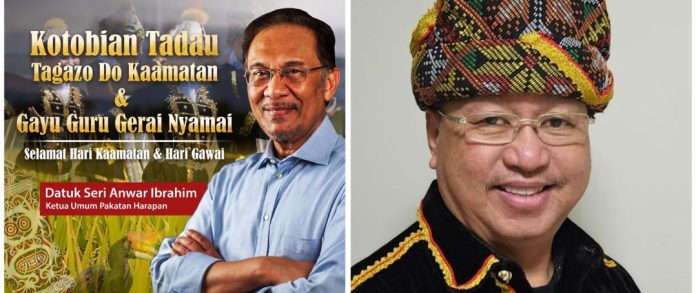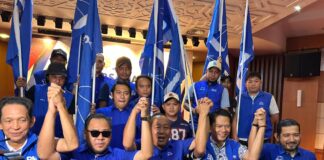By Bob Munang JP
Life Member of the Kadazan Dusun Cultural Association (KDCA) Founding Life Member of the Momogun National Congress (MNC)
KOTA KINABALU: The upcoming attendance of Malaysian Prime Minister Anwar Ibrahim at the state-level Tadau Ka’amatan celebration in the Hongkod Koisaan, Penampang on May 31st, 2023, is expected to mark a significant milestone in Sabah’s and Malaysia’s political history.
This occasion will be noteworthy as it will be the inaugural participation of Malaysia’s Prime Minister in the Tadau Ka’amatan, an important cultural celebration in Sabah, which holds special importance for the Kadazan/Dusun indigenous community, in particular, and the people of Sabah, in general.
Since Sabah became part of the Malaysian Federation on September 16, 1963, I do not remember any previous Prime Minister has ever attended or participated in the state-government-organized Tadau Ka’amatan in Sabah.
Perhaps the Tadau Ka’amatan was seen more as Sabah’s domestic event for the Kadazan/Dusun community in Sabah and hence did not hold much significance to the Federal government and political leaders in West Malaysia.
Previously, Sabah’s leaders did not receive the deserved respect, despite the potential for Sabah to have emerged as a sovereign country, similar to Brunei and Singapore.
Sabah was perceived as more of a subordinate state rather than as a partner in the Federation.
In fact, with its abundant natural resources, including oil, gas, forests, and fertile agricultural land, Sabah could have sustained itself independently.
The Kadazan/Dusun people who are generally peace-loving people have always played a significant role in Sabah politics since the early days of Malaysia.
However, the Kadazan/Dusun community has always felt marginalized due to the apparent pro-Malay policies of the Malay-dominated Federal government, particularly in terms of appointments in the civil service, award of scholarships and economic opportunities, as well as the Federal government’s perceived soft stance against the influx of illegal immigrants in Sabah, among other issues.
It is because of this discontentment that the Kadazan/Dusuns have rallied behind their own leaders, who, in turn, have been vocal in pursuing their community’s interests and critical of the government of the day.
When the government parties fail to secure victory in general elections, particularly in constituencies predominantly inhabited by the Kadazan/Dusun community, they often label these areas as anti-government and subsequently penalize the areas by neglecting their needs and disregarding their requests.
By employing divisive tactics, previous governments, successfully fragmented the Kadazan/Dusun political leaders, resulting in significant hardships and heightened discontentment. However, with the recent change in leadership at the Federal level, this dynamic may now undergo a transformation.
The Unity Government, led by Prime Minister Anwar Ibrahim, has introduced the Malaysia Madani concept, aiming to reform Malaysia into a country that upholds humanity and core values such as fair, just, and effective governance.
Among its fundamental principles are respect and trust, which were notably absent in the previous administration.
The attendance and participation of Prime Minister Anwar Ibrahim in the state government’s sanctioned Tadau Ka’amatan serve as a testament to his trust and respect for Sabah, signaling the start of numerous positive changes for the region. I am quite confident that the Prime Minister’s sincere gesture will be reciprocated by the Sabah leaders, in particular and the people, in general, and give their full support to him in leading Malaysia


